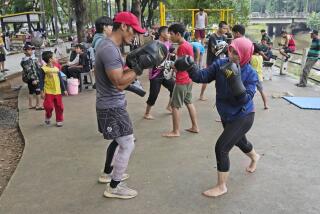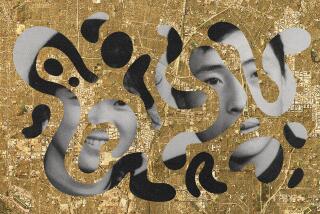Forum to Focus on Spouse Abuse Among Asians : Conference: Little Tokyo event today will examine cultural barriers faced by battered wives.
Domestic violence, a subject long suppressed in traditional Asian cultures, will be in the spotlight at a public forum in Los Angeles today as community leaders try to capitalize on the publicity generated by the O.J. Simpson case to draw attention to special problems facing Asian victims.
Incidents of domestic violence are as prevalent among Asian Americans as among other groups in this country, but Asian victims--especially immigrants--face added obstacles because of ignorance and language and cultural barriers, say organizers of Southern Californiaâs first Asian-Pacific domestic violence conference in Little Tokyo.
âSome come from cultures where it is an accepted practice for men to batter their wives to train them,â said Kaoru Ichikawa, a psychiatric social worker at the Asian Pacific Counseling & Treatment Center. In such cases, victims as well as their abusers have to be told that in the United States it is illegal to beat spouses, she said. âWe need to help the men change their behavior.â
âEven when victims know they have a right to be free from abuse, they put up with it because they donât want to bring shame to the family,â said Im Jung Kwuon, who will be among the speakers at todayâs all-day session.
Kwuon said a lot of abuse in Asian families has to do with the age-old Eastern notion that men are superior to women. Women endure because they believe they have no social standing without their husbands and children, she said.
Many Asian women also fear losing their children if they leave their husbands, she said. In some Asian cultures, children belong exclusively to the father. Although this is not the case here, many still believe that, said Kwuon, a counselor at the Korean Family Counseling and Legal Advice Center in Koreatown.
Other reasons for victimsâ silence include lack of money, isolation and fear, said Estelle Chun, a family law specialist at the Asian Pacific American Legal Center of Southern California.
âAs tragic as spousal abuse is for white women, born here . . . with friends and relatives, you just canât compare that to (the plight of) immigrant women,â she said. âThey have no money, they donât speak English--they donât even know how to take the bus.â
Chun, who has counseled hundreds during her nine years at the center, said denial is the biggest problem among Asians--victims and abusers alike.
She said women come to her not as a result of contacting police but because their neighbors alerted authorities or they ended up in a hospital emergency room.
The Center for the Pacific Asian Family operates the only shelter for battered Asian women in Los Angeles.
Chun noted that although cases of domestic violence reported to mainstream agencies have shot up since the Simpson case, there has been no noticeable increase at her center. Separate statistics for Asian American victims citywide are unavailable. Chunâs center handles about 500 family law cases a year, and more than half of those involve spousal abuse.
âThey come to our office full of scars,â she said. âThere is a lot of abuse during pregnancy when husbands kick their wives in the stomach,â she said.
Some of the saddest cases Chun has handled involved Asian women married to American soldiers.
Living on military bases, isolated from other Asians physically and socially--because of the stigma attached to Asian women married to U.S. servicemen--many live in fear, she said.
They are afraid that if they turn in their husbands, they will be deported, she said. Under immigration laws, foreign nationals married to U.S. citizens have to be sponsored by their American spouses to seek permanent residency.
Todayâs conference, sponsored by the Asian Pacific American Legal Center and Network Against Asian Pacific Domestic Violence, will be held from 8:30 a.m. to 4:30 p.m. at the Centenary United Methodist Church, 300 S. Central Ave.
More to Read
Sign up for Essential California
The most important California stories and recommendations in your inbox every morning.
You may occasionally receive promotional content from the Los Angeles Times.










